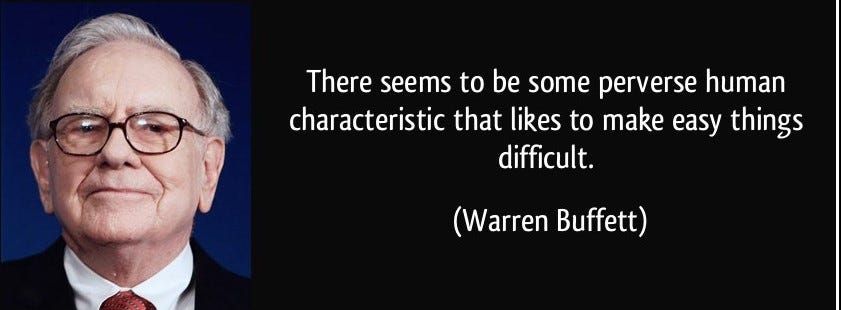Lesson 3: Being a value investor
Value Investing 101: introductory course
Value investing has existed since the first stock exchanges, but for a long time, it received little attention. In the 1990s, the public preferred fast-growing tech companies over solid businesses that produced soap and paint. Today, AI is favored over pencil manufacturers or specialized construction machinery.
Yet, value investing has consistently rewarded its loyal followers with strong results, often outperforming market averages. It has not only brought wealth in good times but also helped investors survive the many market crashes of the 20th and 21st centuries.
But what does it really mean to be a value investor?
At first glance, it seems simple: you look for stocks you believe are worth more than their current price. But if that were all, everyone would be successful. In reality, value investing is both a mindset and a discipline.
As Charlie Munger put it:
"All intelligent investing is value investing – acquiring more than you pay for."
What Is Value Investing Really?
Ask the average investor what value investing is, and the typical answer will be: "buying cheap stocks." However, this is a misconception. A low-priced stock is not necessarily a good investment.
As Munger further explained:
"You’re looking for a mispriced opportunity. That’s investing. And you need to know enough to determine whether an opportunity is mispriced. That’s value investing."
Value investing is not about price but about value. A stock is only truly cheap if it costs less than the actual worth of the underlying company.
Benjamin Graham, the father of value investing, summarized it perfectly in Security Analysis:
"An investment operation is one which, upon thorough analysis, promises safety of principal and a satisfactory return. Operations not meeting these requirements are speculative."
In other words, without thorough analysis, you’re not really investing. Everyone wants to buy low and sell high, but only a small percentage of investors do this in a structured and well-thought-out manner.
Why Is Value Investing So Difficult?
The concept of value investing seems simple, but applying it is anything but easy. Why?
Patience is crucial – It can take years for an undervalued stock to rise to its true worth. Many investors give up before that happens.
Discipline is necessary – You must stick to your strategy, even when the market is against you.
Emotions are your biggest enemy – Fear and greed can cloud your judgment and distract you from your analysis.
You often have to go against the crowd – It takes courage to buy when others are selling and to resist hype stocks.
Knowledge and analysis are essential – Value investing requires deep research into companies, markets, and financials.
This is why many investors think they are value investors but ultimately cave to market pressure and abandon their strategy when things get tough.
How Do You Become a Value Investor?
Warren Buffett said in 1992:
"We find the term ‘value investing’ redundant. After all, what is investing if not seeking value that at least justifies the price? Consciously paying more for a stock than its calculated worth, hoping to sell it soon at an even higher price, should be labeled ‘speculation.’"
True value investors don’t focus on price but on the value behind the stock. They look at factors such as:
Strong management
Sustainable competitive advantages (moats)
Consistent cash flows
Financial health
That’s why Buffett also emphasized:
"A high price-to-earnings ratio or a low price-to-book ratio means nothing on its own. It’s about the true value of the business."
Many investors buy cheap stocks without understanding why they are cheap. Sometimes, stocks are cheap for a good reason—perhaps because the company is struggling, heavily in debt, or facing tough competition.
A value investor looks beyond the surface and asks: Why is this stock cheap?
What Sets a Good Value Investor Apart?
In The Art of Value Investing, Whitney Tilson outlined thirteen traits of successful value investors:
Focus on intrinsic value – What is the company really worth?
Use a systematic approach – What are you looking for and why?
Conduct deep research – Don’t blindly follow tips.
Favor micro over macro – Don’t speculate on interest rates or oil prices.
Consider reversion to the mean – Cycles tend to return to their averages.
Go against the crowd – Buy when others are selling.
Think long-term – Don’t focus on the next quarter.
Take a few, well-considered positions – Quality over quantity.
Don’t just follow the index – Dare to diverge from the market.
Avoid permanent loss – Don’t just follow stock prices.
Focus on absolute returns – Not just relative performance.
Be patient – Investing is a marathon, not a sprint.
Acknowledge and learn from mistakes – The best investors keep improving.
A value investor understands that the stock market often behaves irrationally. Short-term prices are driven by emotions, but in the long run, value always wins.
As Howard Marks put it:
"Value investing is not about doing smart things, but about avoiding stupid things."
The Human Factor in Value Investing
Why are there so few successful value investors? The answer lies in human psychology.
We want quick results – People are impatient and seek immediate rewards.
We hate losses more than we love gains – This makes investors panic-sell during downturns.
We follow the crowd – It’s hard to go against the prevailing opinion.
Value investing means sometimes underperforming for long periods because the market is irrational. It requires mental strength to stick to your strategy, even when others mock you or claim you "don’t understand the market."
As Buffett once said:
"It seems to be a human trait to make easy things difficult."
But for those with the patience and discipline to be a true value investor, the rewards are there.
Conclusion & Homework
Value investing is not a magic formula. It’s a philosophy centered on identifying value and patiently waiting for the right moment to act.
Homework:
Analyze your portfolio – Did you buy stocks based on value or price movements?
Read about a value investor of your choice – Graham, Buffett, Klarman—what can you learn from them?
Write down your definition of value investing and revisit it in a year.
The key to success? Patience, discipline, and a focus on value.
Know someone struggling with their investment strategy? Share this lesson.
As Buffett said:
"The stock market is a device for transferring money from the impatient to the patient."






"A high price-to-earnings ratio or a low price-to-book ratio means nothing on its own. It’s about the true value of the business." Simple phrase, but it says a lot. Congrats on the content, Sam!